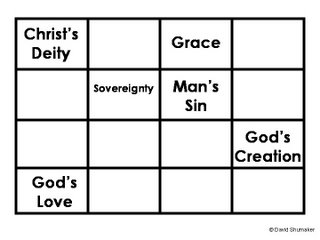Our first meeting went very well. After some brief introductions we began to discuss the importance of systematic theology. We discussed the Systematics Grid which is an analogy of the helpfulness, as well as the potential harm of systematics. With this approach to scripture, we have certain absolutes that cannot be denied that scripture is very clear on. Some of those are represented in the grid below. Once we understand those doctrines, we can fill in some of the other blanks using reason and logic. The conclusions lead us to beliefs about issues the scripture isn't as clear on. Some of these things are eschatology (doctrine of last things), dating, free will, etc. The danger is being dogmatic (believing you are right and everyone else is wrong) about these issues that aren't as clear. What this study will hopefully accomplish will be to make the clear teachings clearer and also clear up some of the foggier issues.
At the end of our time this morning we began to talk about the rabbit trail of Revelation. Is it to be taken literally or figuratively? Here is the passage we looked at:
"The revelation of Jesus Christ, which God gave him to show to his servants the things that must soon take place. He made it known by sending his angel to his servant John, 2who bore witness to the word of God and to the testimony of Jesus Christ, even to all that he saw. 3Blessed is the one who reads aloud the words of this prophecy, and blessed are those who hear, and who keep what is written in it, for the time is near." -Revelation 1:1-3 (ESV)
We came to the conclusion that the book of Revelation, as well as other prophetical books, are just as important for us to understand as other "easier" books of the Bible. This passage tells us that the original readers were blessed if they understood and kept what was written in the book; not just chapters 1-3 and the end, but the whole thing, even the parts that seem future or are hard to undrstand. Just because we can't see the purpose or the application at the moment, doesn't mean we never will.
As far as the answer to the question, we'll get to that at a later date. Here's a question for you to ponder. What did John mean when he wrote that the time was near and that these things must soon take place? How would the original readers interpret that and how should we interpret it? What presuppositions or things you assume to be true are influencing how you answer that question? I look forward to your comments.
"The revelation of Jesus Christ, which God gave him to show to his servants the things that must soon take place. He made it known by sending his angel to his servant John, 2who bore witness to the word of God and to the testimony of Jesus Christ, even to all that he saw. 3Blessed is the one who reads aloud the words of this prophecy, and blessed are those who hear, and who keep what is written in it, for the time is near." -Revelation 1:1-3 (ESV)
We came to the conclusion that the book of Revelation, as well as other prophetical books, are just as important for us to understand as other "easier" books of the Bible. This passage tells us that the original readers were blessed if they understood and kept what was written in the book; not just chapters 1-3 and the end, but the whole thing, even the parts that seem future or are hard to undrstand. Just because we can't see the purpose or the application at the moment, doesn't mean we never will.
As far as the answer to the question, we'll get to that at a later date. Here's a question for you to ponder. What did John mean when he wrote that the time was near and that these things must soon take place? How would the original readers interpret that and how should we interpret it? What presuppositions or things you assume to be true are influencing how you answer that question? I look forward to your comments.
Assignment for next time (Nov. 18th): Read chapter 1 and be ready to discuss
If you need a book, they are available from me at church for $20


No comments:
Post a Comment